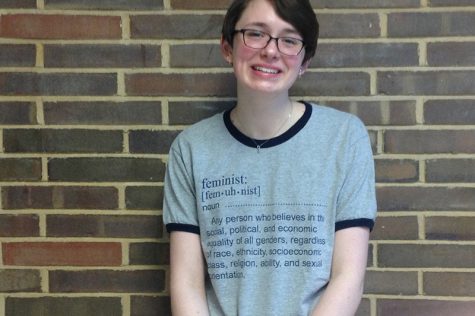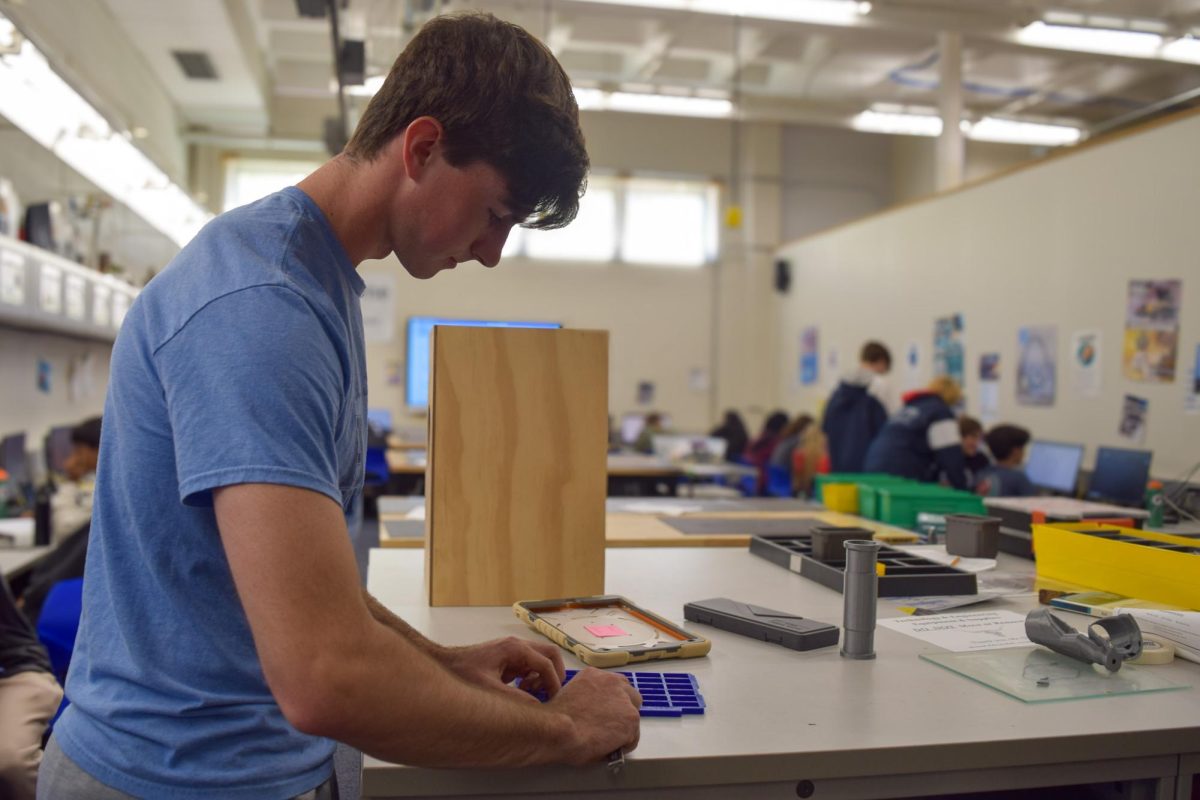
Feminist club Co-President, junior Ann Truka wears her feminist definition shirt to show her support for gender equality and identity.
Social media’s impact on gender inequality is issued around the world, from the images women are expected to follow to the way men are expected to respond.
According to NYC Girl’s Project, social media has created an ideal image of how women should present themselves.
“The exposure that most people have to girls is a lot of visual media which makes society be a lot more of a visually based judgement system,” freshman Jonathan Ma said. “I think that makes it so that there is a lot larger focus on the superficial outside appearance of people.”
In consonance with NYC Girl’s Project, The University of Pittsburgh Gender, Sexuality and Women’s Studies Program notes the pressures that males feel when responding to a woman’s appearance on social media.
“It’s hard for guys because it gives an impression to us that all women are like this given image, but they aren’t,” junior Conor Ryan said. “There’s more to them than looks. It’s [the media’s] ruining our views of other people.”
Media apps and sites such as Instagram, Snapchat and Twitter have given adolescent males and females an impression of how women should present themselves.
“When Vine was a thing, people would say, ‘Oh, she got that a**,’ and that stuff. It seemed like to prove your masculinity you’d have to say those things,” junior Meghan Larsen said. “When all your friends are doing it, and popular people are doing it, then it’s like ‘Oh, that’s what I should be doing,’ and especially when you’re a teen, you don’t really know or aren’t secure of yourself.”
Groups such as feminists introduce ways to fight for gender equality of all races and religions, yet there are still skeptics about these associations.
“It’s weird because there have been a lot of movements like in feminism to make it so that women aren’t objectified, but when it comes to social media, I think objectifications have gotten worse,” Larsen said. “I felt that in order to be pretty, I had to have the perfect body, specifically like boobs and butt, and I think guys feel that in order to be masculine, you have to point those things out.”
Feminist Club co-president junior Ann Truka defines feminism as a movement that helps stimulate awareness of gender inequality, not necessarily a movement of feminist extremists.
“There’s so much intersectionality in feminism, and so many different factors that go into it. Social media only portrays that one image [of extremism], and there needs to be multiple images,” Truka said. “I feel like if people actually knew what feminism stood for, there would be a bigger movement for it now and less judgement.”
According to Truka, social media has an impact on both males’ and females’ expected identity and representation.
“[On social media,] you see so many pictures of “perfect” people because you can cultivate it, and that’s what people put out there and are seeing,” Truka said. “There’s this expectation to be a certain way, and I feel like that expectation comes from the girls themselves and also from what the boys see and notice. It’s just becoming the norm.”
The misconceptions of feminism, images of how women should define themselves and social pressures men receive on proving their masculinity all contribute to the impact social media has on gender equality and people’s identity among our communities.
“We [all genders] feel emotions, and we are not objects,” sophomore Lindsay Perrett said. “We are people.”


![Focused on providing exceptional service, sophomore Darsh Mahapatra carefully cleans the door of a customer’s car. Mahapatra has always believed his customers deserve nothing less than the best. “[If] they’re trusting us with their car and our service, then I am convinced that they deserve our 100 percent effort and beyond,” Mahapatra said.](https://pwestpathfinder.com/wp-content/uploads/2025/10/DSC_0018-1200x800.jpg)
![Sophomore Aleix Pi de Cabanyes Navarro (left) finishes up a soccer game while junior Ava Muench (right) warms up for cross country practice. The two came to Parkway West High School as exchange students for the 2025-2026 school year. “The goal for the [exchange] program is to provide opportunities for both Parkway students and our international exchange students to learn about other cultures, build connections and become confident, capable, curious and caring — Parkway’s Four C’s — in the process,” Exchange Program Lead Lauren Farrelly said.](https://pwestpathfinder.com/wp-content/uploads/2025/10/Feature-Photo-1200x800.png)

![Gazing across the stage, sophomore Alexis Monteleone performs in the school theater. The Monteleone family’s band “Monte and the Machine” has been releasing music since 2012, but Alexis started her own solo career in 2024 with the release of her first single, Crying Skies. “My whole family is very musical, [and I especially] love writing [songs with them],” Monteleone said.](https://pwestpathfinder.com/wp-content/uploads/2025/09/DSC7463-1200x798.jpg)
![Amid teaching a lesson to her AP Calculus BC class, Kristin Judd jokes alongside her students in their funny remarks. Judd has always enjoyed keeping the mood light in her classroom, along with on the volleyball court. “[I enjoy] that side talk where you see [or] overhear a conversation and chime in, or somebody says something funny,” Judd said.](https://pwestpathfinder.com/wp-content/uploads/2025/09/image-1200x730.jpg)
![Eyeing the ball, junior Ella McNeal poses for her commitment pictures at Clemson University. McNeal’s commitment comes after months of contact with top Division 1 soccer programs. “ It has taken a lot to get to where I am, but I know that [what] I've already been through is just the beginning, and I can't wait for what is to come,” McNeal said.](https://pwestpathfinder.com/wp-content/uploads/2025/09/IMG_4926-1200x900.jpeg)


![Senior Adam Zerega stands with senior Dexter Brooks by farm equipment. Zerega often worked with friends and family on his farm. “I've been able to go to my family's farm since I was born. I [spend] at least three weekends a month [on the farm], so I'm there all the time,” Zerega said.](https://pwestpathfinder.com/wp-content/uploads/2025/04/IMG_4872-1200x900.jpg)


Mr. Cheff • Feb 13, 2017 at 10:12 am
Agreed